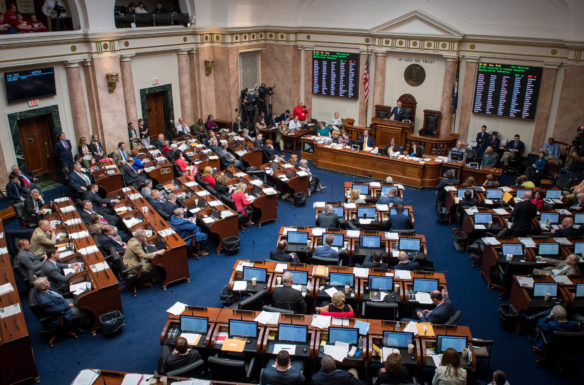
The 2018 Regular Session ended with a new budget for the 2018-20 biennium, along with changes to the current tax provisions that provide some relief in the latest round of budget cuts.
Photo by Bobby Ellis, April 13, 2018
By Tracy G. Herman
tracy.herman@education.ky.gov
The 2018 Regular Session ended with a new budget for the 2018-20 biennium, along with changes to the current tax provisions that provide some relief in the latest round of budget cuts.
For the K-12 elementary and secondary education budget, the SEEK per pupil guarantee increased slightly from $3,981 to $4,000 per student in each fiscal year. The budget also maintained school transportation funding at the current funded level.
While the budget generally maintains the 6.25 percent reduction across most agencies, the tax proposal increased the cigarette tax to 50 cents a pack and expanded the state sales tax to specific services. The General Assembly also passed a flat 5 percent income tax rate for individuals and corporations.
Both the budget, HB 200, and the revenue provisions, HB 366, were vetoed by Gov. Matt Bevin. The General Assembly overrode both vetoes.
Local boards of education, school-based decision making councils and teachers will be implementing lots of new laws through the coming months. Here is a look at some of the new laws:
SENATE BILLS
Senate Bill 71 (Sen. Stephen Meredith) requires abstinence education to be included in any human sexuality or sexually transmitted diseases curriculum adopted by a school council. It also requires that if a school council, or the principal if no council exists, adopts a curriculum for human sexuality or sexually transmitted diseases, instruction must include, but not be limited to, the following content:
- Abstinence from sexual activity is the desirable goal for all school-age children;
- Abstinence from sexual activity is the only certain way to avoid unintended pregnancy, sexually transmitted diseases and other associated health problems; and
- The best way to avoid sexually transmitted diseases and other associated health problems is to establish a permanent, mutually faithful, monogamous relationship.
Senate Bill 73 (Sen. David Givens) lets a school district establish a pilot program for teachers to develop and implement a performance-based professional development project. The pilot program, beginning in the 2018-19 school year and continuing through the 2020-21 school year, must require two or more teachers to design an instructional practice or strategy project to address an academic or non-academic classroom problem in a school or district. Successfully completing a project will satisfy up to three of the four days of required annual professional development. A local board of education may award a teacher a stipend for successfully completing a project.
The Kentucky Department of Education (KDE) must study the completed pilot projects for their impact on schools and districts to determine the attributes of quality performance-based professional development and the best practices for measuring its effectiveness. By Aug. 1, 2022, the KDE must report its findings and any recommendations for revising professional development policy to the Interim Joint Committee on Education.
Senate Bill 101 (Sen. Max Wise) reduces the vacancy notice required from a superintendent to the chief state school officer from 30 days to 15 days. It also requires the electronic publication of the complete school laws of the state and requires school board candidates to file a transcript with the chief state school officer showing completion of the 12th grade or certified results of a 12th grade equivalency examination. Takes effect immediately.
Senate Bill 140 (Sen. Albert Robinson) requires the commissioner of education to email electronic copies or send paper copies of KRS 158.183 and KRS 158.195 to each local school board, school-based decision making council and certified employee in Kentucky. The bill also requires KDE to submit a copy of all materials sent as part of the notice and the dates materials were distributed to the Interim Joint Committee on Education.
Senate Bill 151 (Sen. Joe Bowen) creates new and amends numerous statutes related to state and local government and school district employee pension provisions.
Senate Bill 152 (Sen. Givens) allows school districts to provide monetary compensation in addition to that provided in the single salary schedule to all classroom teachers employed in a school identified by KDE as being in targeted or comprehensive support and improvement status.
SENATE RESOLUTIONS
Senate Joint Resolution 52 (Sen. Danny Carroll) requires the KDE to partner with the University of Kentucky’s Human Development Institute (HDI), the University of Louisville’s College of Education and Human Development and local school districts to implement the Kentucky Peer Support Network Project in public schools. The bill requires KDE to partner with UK and U of L to identify and secure grant funding for the Peer Network and the Teaching and Learning Pathway.
KDE will report to the Interim Joint Committee on Education on the status of funding efforts no later than July 1 of each year and the report must include a copy of all grant applications submitted by KDE or HDI during the previous academic year. The reporting requirement is waived for years the Kentucky Peer Support Network Project is fully funded.
Senate Resolution 143 (Sen. D. Carroll) honors the victims of the Marshall County High School shooting and offers encouragement and support to the entire Marshall County community.
HOUSE BILLS
House Bill 3 (Rep. Jonathan Shell) requires each school district to promote an essential workplace ethics program beginning with the 2019-20 school year. Each school district’s local workforce investment board must recommend to the school district best practices that may be used in implementing the essential workplace ethics program.
In addition, the bill requires:
- By Jan. 1, 2019, and every two years thereafter, each local school board to collaborate with the local workforce investment board to establish essential workplace ethics indicators for middle and high school students that are aligned to the characteristics outlined.
- Each local board to design an award to reflect that a student has attained workplace ethics indicators.
- By Sept. 1, 2019, and every two years thereafter, the superintendent of each school district to provide the commissioner of education and the Kentucky Workforce Innovation Board (KWIB) a report, in a format specified by the commissioner, describing the district’s programs and how they are being implemented. The commissioner must provide a summary report to the Kentucky Board of Education, Interim Joint Committee on Education, KWIB and each Kentucky superintendent.
- The essential workplace ethics program to be included on the school profile report.
- The academic standards in practical living skills for all grade levels to include drug abuse prevention, with an emphasis on the prescription drug epidemic and the connection between prescription opioid abuse and addiction to other drugs.
- By Dec. 31, 2018, the Office of Drug Control Policy to develop recommendations for the instruction in drug abuse prevention.
The drug prevention requirements take effect immediately.
House Bill 30 (Rep. Regina Huff) requires that beginning with the 2018-19 school year, and every other year thereafter, all high school and middle school principals, guidance counselors, and teachers will receive a minimum of one hour of suicide prevention training. The training can be either in-person, by live streaming or via a video recording. Newly hired staff members will receive a packet of information on suicide prevention if the person is hired in a year training is not provided.
This training may be included in the four days of required annual professional development. The bill requires the suicide prevention training to also apply to public charter schools.
House Bill 128 (Rep. John Carney) requires every public middle and high school’s curriculum to include instruction on the Holocaust and other cases of genocide, as defined by the United Nations Convention on the Prevention and Punishment of the Crime of Genocide.
House Bill 132 (Rep. Jim DuPlessis) stipulates that beginning with the entering 9th-grade class of the 2020-21 school year, students must successfully complete one or more course or programs that meet the financial literacy standards to graduate. The requirement applies to students participating in the early graduation program.
KBE must promulgate administrative regulations establishing the standards and a graduation requirement. Local school-based decision making councils, or principal if no council exists, at each high school must determine curricula for course offerings or programs that are aligned to state standards.
House Bill 147 (Rep. Mark Hart) describes the requirements of school personnel designated to administer medication prescribed to treat seizure disorder symptoms, as well as the instruction in administering seizure medications, recognition of the signs and symptoms of seizures, and the steps to be taken to respond. KDE’s Medication Administration Training Program and the supporting training manual reflect this information.
The bill requires a parent or guardian of a student diagnosed with a seizure disorder to collaborate with school personnel to implement a seizure action plan. The Kentucky Board of Education will create administrative regulations regarding the implementation of seizure action plans.
A minimum of one hour of self-study review of seizure disorder materials will be required of all teachers, guidance counselors and principals hired after July 1, 2019. All current principals, guidance counselors and teachers will complete one hour of self-study review of seizure disorder materials by July 1, 2019.
House Bill 168 (Rep. Jeff Hoover) requires all operators of buses and motor vehicles used for transporting children to stop the vehicle at railroad crossings and look for approaching on-track equipment.
House Bill 187 (Rep. Addia Wuchner) creates a new section of KRS Chapter 158 to define “dyslexia,” “evidence-based” and “phonemic awareness.” It requires KDE to make a dyslexia toolkit available by Jan. 1, 2019.
The legislation also requires:
- KDE to collaborate with the Education Professional Standards Board (EPSB) and the Council on Postsecondary Education (CPE) to update professional development for teachers related to dyslexia. Each local school district can develop policies for identifying and assisting students in kindergarten through grade three with dyslexia.
- Local school districts to develop a policy to provide KDE specific data by June 30 each year.
- KDE to establish a study project to gather information on early screening and intervention services for children with characteristics of dyslexia. A final report outlining the findings of the study must be submitted by KDE to the Interim Joint Committee on Education by Nov. 1 after the final academic year of the study project.
- KDE to provide survey data on the types of evidence-based research interventions being implemented by districts in reading, writing, mathematics and behavior in kindergarten through grade three by Nov. 30 each year to the Interim Joint Committee on Education.
- By the 2019-20 academic year, postsecondary institutions to offer teacher preparation programs for elementary and secondary regular education that includes instruction on dyslexia.
House Bill 290 (Rep. Carney) requires the state board or the agency designated by the state board to manage interscholastic athletics to allow nonmember, at-home private school teams or students to participate in any sports permitted, offered or sponsored by the Kentucky High School Athletic Association (KHSAA). Nonmember, at-home private school coaches must comply with the requirements of KHSAA coaches.
House Bill 367 (Rep. Wuchner) establishes a dyslexia trust fund to be administered by KDE. The purpose of the fund is to finance grants to local school districts for support of students identified with dyslexia. KDE must submit an annual report detailing expenditures of the fund to the Kentucky Board of Education and the General Assembly. This bill becomes effective Jan. 1, 2019.
House Bill 527 (Rep. Steve Riley) requires the Department for Community Based Services (DCBS) to place a foster child within the school district where the child was enrolled immediately prior to placement if practicable. The bill requires DCBS to make the determination on whether a foster child shall remain enrolled in the school of origin based upon the best interest of the child; the cost of transportation must not be a factor in determining the best interest of the child.
The legislation also requires reasonable transportation to be offered if DCBS determines it is in the best interest of the child to remain enrolled in the school of origin after placement in a new school district. It establishes procedures for enrolling a foster child if changing the child’s school of enrollment is in the best interest of the child and requires the district in which the foster child is enrolled upon successful completion of high school graduation requirements to issue a diploma to the child.
House Bill 586 (Rep. James Tipton) requires the Education Professional Standards Board (EPSB) to extend the validity period of a certificate of a member of the U.S. armed forces by one year for each year the member is determined by EPSB to have been prohibited by military service or training from pursuing an advanced degree or completing the professional development required to maintain certification.
House Bill 592 (Rep. Carney) requires the Kentucky Council on Postsecondary Education to develop a statewide policy to promote employee and faculty development in state and locally operated secondary area technology centers through the waiver of tuition for college credit coursework. Any regular full-time employee at a state or locally operated secondary area technology center may, with prior approval of the course offering institution, take a maximum of six credit hours per term at any public postsecondary institution.
The employee must complete the Free Application for Federal Student Aid to determine the level of need and eligibility for state and federal financial aid programs. The amount of tuition waived must not exceed the cost of tuition at the institution less any state or federal grants received, which will be credited first to the student’s tuition.
HOUSE RESOLUTIONS
House Resolution 126 (Rep. Will Coursey) honors the victims of the Marshall County High School shooting and offers encouragement and support to the entire Marshall County community.
NOTE: The Kentucky attorney general has opined (OAG-18-007) that “the effective date of legislation passed by the 2018 Regular Session of the Kentucky General Assembly, except for general appropriation measures and those containing emergency or delayed effective date provisions, is the first moment of July 14, 2018, since 90 full days will have passed after final adjournment on April 14, 2018.”




Leave A Comment